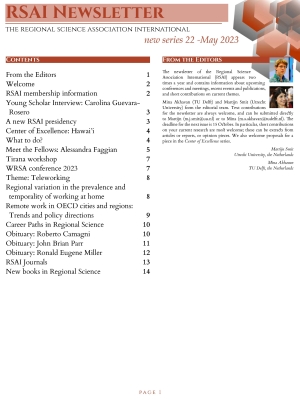Archives
Elisabete Martins
RSPP Call for Papers | Special Issue: Regional disparities, social welfare and economic development in Latin America

Regional Science Policy & Practice (RSPP)
Call for Papers Special Issue: Regional disparities, social welfare and economic development in Latin America
Guest editors
Carolina Guevara Rosero, Departamento de Economía Cuantitativa, Facultad de Ciencias, Escuela Politécnica Nacional - carolina.guevara@epn.edu.ec
Karina Sass, University of Sao Paulo - karinasass@usp.br
Motivation
The Latin American countries are the most unequal countries in the world, not only considering income inequality across individuals but also across regions within them. Specifically, in Latin America, on average, the ratio between the richest region and the poorest region is approximately 8 times while in OECD countries, this ratio reaches only 2 times (ECLAC-ILPES, 2012). Therefore, spatial disparities across regions within Latin American countries need to be analyzed more deeply to have a better comprehension of its causes and effects. It is especially interesting to analyze the case of Latin American cities since they have particularities that are not accounted for in theories for developed countries, such as informality, poverty, crime, insecurity, economic specialization, urban expansion, among others. Differences across regions within LAC countries in various dimensions such as basic infrastructure, amenities, transport infrastructure, innovation, productive and social networks, and socioeconomic characteristics in general may influence the economic performance and welfare of economic agents, including people, communities and firms in those regions.
While big cities are attractive places to workers and firms due to more and better opportunities, they face issues such as crime and insecurity. Although small cities would not have severe problems of insecurity, they lack basic services.
This calls for public policy recommendations and actions aiming to reduce unequal regional development and growth.
This special call aims to mobilize studies on regional disparities in Latin America that give insights for possible policy recommendations. We kindly invite contributions on topics related (but not limited) to:
• Spatial disparities at the subnational level, causes and effects
• Firms (innovation) and social networks in regions
• Effects of spatial disparities in economic performance
• Effects of spatial disparities in welfare
• Regional migration
• Regional economic structure and productive networks and resilience
Invitation for submission
We welcome original, unpublished papers that address the above questions, or any other research questions not mentioned, as they relate to regional economics. We look forward to papers from all parts of the world.
Please note that the deadline for submitting papers to https://www.sciencedirect.com/journal/regional-science-policy-and-practice for the RSPP Special Issue on Regional disparities in Latin America and social welfare and economic development is December 15, 2023, with foreseen publication of accepted papers in 2024. Please contact rspp@regionalscience.org if you need more information.
The New Issue of Regional Statistics is already Available! (2023, VOL 13, No 3)
THE NEW ISSUE OF REGIONAL STATISTICS IS ALREADY AVAILABLE!
We are pleased to inform you that a new issue of the Regional Statistics has been released and now it’s available online.
https://www.ksh.hu/terstat_eng_current_issue
REGIONAL STATISTICS, 2023, VOL 13, No 3.
STUDIES
Arnoldo López-Marmolejo – C. Vladimir Rodríguez-Caballero: Assessing the effect of gender-related legal reforms on female labour participation and GDP per capita in the Central American region
https://www.ksh.hu/statszemle_archive/regstat/2023/2023_03/rs130301.pdf
Nguyen Van Thanh – Dung Thi Thuy Nguyen – Phuong-Tra Vu – Hiep Ngoc Luu – Hoa Hanh Hoang : The impact of polarisation on Covid-19 outcomes, 2020
https://www.ksh.hu/statszemle_archive/regstat/2023/2023_03/rs130302.pdf
Mohammad M. Jaber: Multidimensional energy poverty in Jordan between 2009 and 2018: Progress and possible policy interventions
https://www.ksh.hu/statszemle_archive/regstat/2023/2023_03/rs130303.pdf
Arnold Tóth – Botond Géza Kálmán – József Poór – Imola Cseh Papp: Impact of the Covid-19 pandemic on unemployment in selected countries and country groups
https://www.ksh.hu/statszemle_archive/regstat/2023/2023_03/rs130304.pdf
Vít Pošta: The disaggregation of the projected impacts of automation in the regional labour markets between 2019 and 2030: Case of the Czech Republic
https://www.ksh.hu/statszemle_archive/regstat/2023/2023_03/rs130305.pdf
András Igari: Spatiotemporal inequalities of excess mortality in Europe during the first two years of the Covid-19 pandemic
https://www.ksh.hu/statszemle_archive/regstat/2023/2023_03/rs130306.pdf
Trang L. Q. Tran – Miklós Herdon – Thich D. Phan – Tuan M. Nguyen: Digital skill types and economic performance in the EU27 region, 2020–2021
https://www.ksh.hu/statszemle_archive/regstat/2023/2023_03/rs130307.pdf
Anel A. Kireyeva – László Vasa – Nailya K. Nurlanova – Lee Jung Wan – Aisulu Moldabekova: Factors causing depopulation of vulnerable regions: Evidence from Kazakhstan, 2009–2019
https://www.ksh.hu/statszemle_archive/regstat/2023/2023_03/rs130308.pdf
Join us to our social networking sites:
New issue of the Romanian Journal of Regional Science, Summer Issue: Vol. 17, No.1, 2023. now available!
The Romanian Journal of Regional Science has released its Summer Issue: Vol. 17, No.1, 2023
http://www.rjrs.ase.ro/index.php/current-issue/
Vol.17, No.1, Summer, Issued June 2023
All articles are downloadable
by Zhiling Wang, Erasmus University Rotterdam and Tinbergen Institute, Amsterdam, Thomas de Graaff, Free University, Amsterdam and Tinbergen Institute, Amsterdam, Peter Nijkamp, Open University, Heerlen, the Netherlands
by Yannis Psycharis, Panteion University, Athens, Anastasia Panori, Aristotle University of Thessaloniki, Greece
Globalization and Pollution in Central and Eastern European EU Countries ● pp. 66-82
by Mihaela Simionescu, University of Bucharest and Institute of Economic Forecasting, Romanian Academy, Romania
by Ion Lucian Cepraz, Fatma Fourati, Loïc Sauvée, Polytechnic Institute Unilasalle, Beauvais, France
BOOK REVIEW
Paweł Churski, Tomasz Kaczmarek (Editors), Three Decades of Polish Socio-Economic Transformations Geographical Perspectives, Springer Economic Geography, Springer Economic Geography, 2022 ● pp.109-112
by Andrzej Miszczuk, Maria Curie-Sklodowska University, Poland
Ecuadorian Section | Call for papers: VII Economic Meeting and the V Meeting of Regional Science (ENACIR), 6-8 September 2023
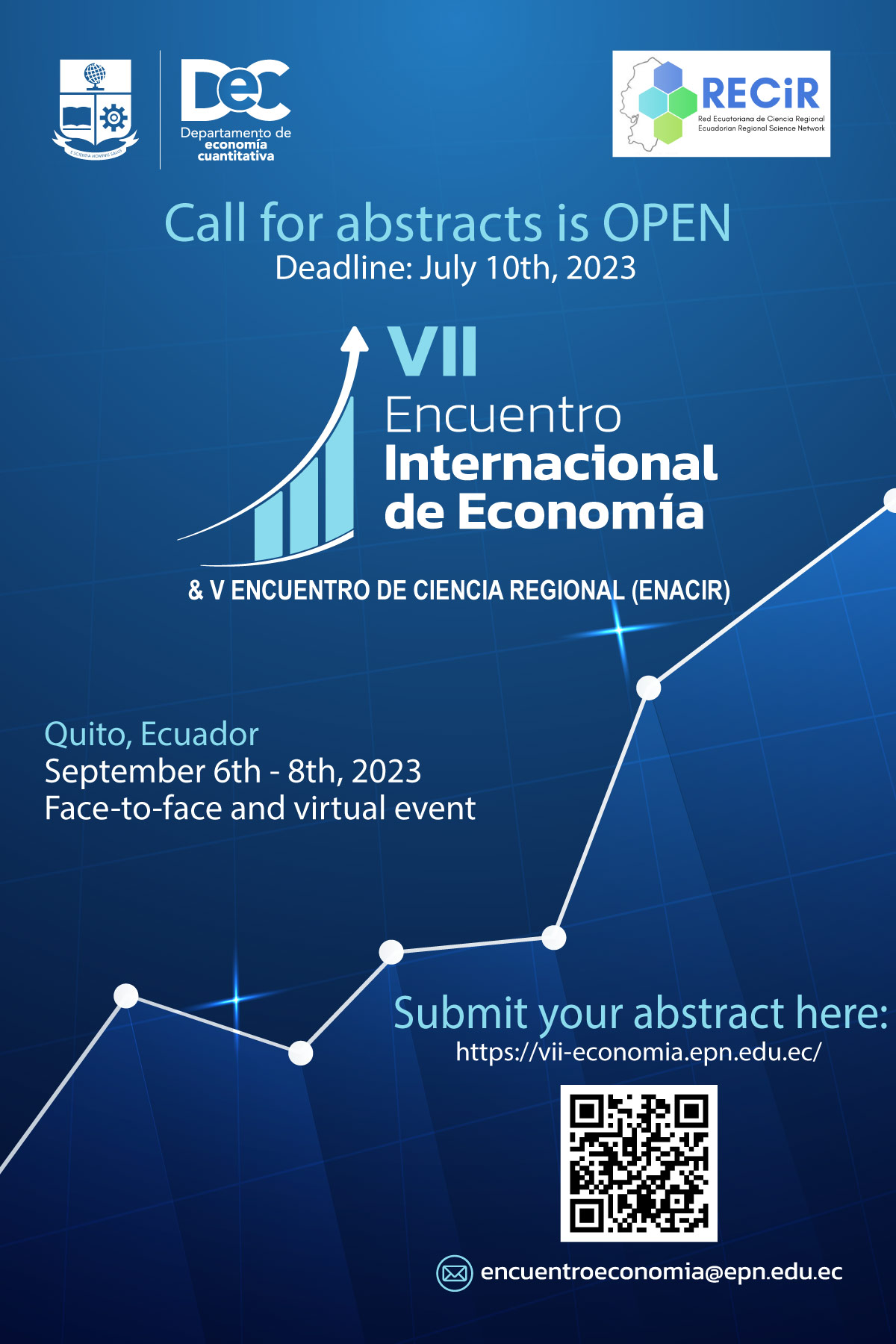
The National Polytechnic School (EPN) and the Ecuadorian Regional Science Network (RECIR) are pleased to announce the VII Economic Meeting and the V Regional Science Meeting (ENACIR), which will take place from 6 to 8 September 2023. These free events are open to researchers, teachers, students and professionals in the economic and related fields.
The V Regional Science Meeting will focus on "Innovation and sustainability in the digital transformation of regions", addressing topics such as technological innovation, digitization of productive processes, digital education, digital governance and digital inclusion. The implications of inequality, migration, innovation and technology in the development of regions will also be discussed.
The VII Economic Meeting will cover a wide range of topics, from post-VOID-19 economic reactivation in Latin America to agrarian economy, industrial economy, welfare economy, regional economy, econometrics, economic policy, environmental and ecological economy, finance, heterodox economy, local economic development and the effects of the COVID-19 pandemic.
The key dates to consider are:
Submission of papers: from May 2 to July 10, 2023
Acceptance of works: from 18 July to 1 August 2023
Registration of participants: from 24 July to 30 August 2023
General public registration: from 24 July to 30 August 2023
Celebration of the meeting: from 6 to 8 September 2023
¡Do not miss the opportunity to participate in these high level academic meetings! For more information, visit our website https://vii-economia.epn.edu.ec/index.php/en.
We hope to see you there!"
More information at: www.vii-economia.epn.edu.ec/index.php/en
The latest issue of Papers in Regional Science are available! Volume 102, Issue 3, June 2023
|
Papers in Regional Science Pages: 461-674 June 2023 |
ISSUE INFORMATION
Pages: 461-462 | First Published: 18 June 2023
EDITORIAL
Pages: 463 | First Published: 18 June 2023
FULL ARTICLES
![]() Open Access
Open Access
Cultural heritage sites, tourism and regional economic resilience
Vinko Muštra, Blanka Škrabić Perić, Smiljana Pivčević
Pages: 465-482 | First Published: 12 April 2023
![]() Open Access
Open Access
Border Effects on firm's productivity: The role of peripherality and territorial capital
Federico Fantechi, Ugo Fratesi
Pages: 483-506 | First Published: 12 April 2023
![]() Open Access
Open Access
A holistic approach of the labour productivity slowdown in the regions of the European Union
Maria Tsiapa
Pages: 507-531 | First Published: 19 April 2023
![]() Open Access
Open Access
Spatial patterns of Cultural and Creative Industries: Creativity and filière behind concentration
Roberto Dellisanti
Pages: 533-564 | First Published: 15 April 2023
![]() Open Access
Open Access
Daniel Pavlačka, Dominik Kaim, Krzysztof Ostafin, Jaroslav Burian
Pages: 565-587 | First Published: 13 April 2023
![]() Open Access
Open Access
Urban crisis vs. urban success in the era of 4.0 technologies: Baumol's model revisited
Roberto Camagni, Roberta Capello, Camilla Lenzi, Giovanni Perucca
Pages: 589-612 | First Published: 29 March 2023
Bangjuan Wang, Weisheng Mao, Junxian Piao, Chengliang Liu
Pages: 613-633 | First Published: 27 April 2023
Nonparametric prediction for univariate spatial data: Methods and applications
Rodrigo García Arancibia, Pamela Llop, Mariel Lovatto
Pages: 635-672 | First Published: 29 April 2023
BOOK REVIEW
Roberta Capello
Pages: 673-674 | First Published: 08 March 2023
New Issue 56 of Investigaciones Regionales - Journal of Regional Research
Investigaciones Regionales - Journal of Regional Research has published the 56th Issue, the second volume corresponding to 2023.
Below you will find the summaries of the papers published in this volume, which can be accessed at https://investigacionesregionales.org/en/revista/issue-56/
We invite authors to submit papers at https://investigacionesregionales.org/en/envio-de-articulos/submission-of-papers-and-others-contributions/
Issue 56
European Regional Policy
Fernando Rubiera Morollón, Tania Fernández García
Spatial Heterogeneity in the Distribution of European Research and Development Funds and its Effects on Territorial Cohesion
The latest research and development (R&D) framework programmes of the European Union (EU), “Horizon 2020” and “Horizon Europe”, have significantly increased the resources available to promote science and innovation in Europe. However, the strong competitiveness of the research teams and their search for excellence may cause inequality in the spatial distribution of investment effort in R&D. The aim of this paper is to analyse the geographic distribution of R&D spending in the EU. A greater concentration of funds is observed in the most advanced and dynamic economies, capable of promoting more competitive research teams and projects. Through an empirical analysis, estimated by a spatial convergence model, it is found that EU R&D funds are preventing cross-regional convergence in Europe by driving growth mainly in wealthier regions. Based on these results, it seems relevant to consider spatial correction mechanisms for the distribution of R&D resources so that they achieve greater territorial cohesion in Europe.
Keywords: Research and development (R&D); competitiveness; productivity growth; regional disparities; territorial cohesion; European Union (EU)
Articles
Ana Melisa Pardo Montaño, Claudio Alberto Dávila Cervantes
The effect of remittance reception in violence. An approximation for the case of Mexico
We analyze the effect of the reception of remittances on violence (approximated by the homicide mortality rate). The relevance of the study lies in the research of two phenomena with high impact on Mexico’s society and economy. We used a linear regression model with instrumental variables. At the municipal level we found a high and positive correlation between the homicide rate and the percentage of households that receive remittances, although this relationship does not extend throughout the whole territory. In general, the reception of remittances had a significant effect in the increase of violence.
Keywords: Remittances; violence; homicides; migration; Mexico
Javier Romaní Fernández, Jordi Suriñach Caralt, Esther Vayá Valcarce
Economic effects associated to airport cities. The case of the Josep Tarradellas Airport - Barcelona - El Prat
Airports have become one of the main factors of urban competitiveness, due to their role as communication nodes and also due to their ability to generate economic activity. The literature shows that, in many metropolitan areas, airports are an important pole of economic activity that attracts companies related to airport activity, but also other types of firms due to their accessibility and the lower price of land compared to the city center. This article describes the plan for the creation of an Airport City at Barcelona Airport and estimates the economic effect that its implementation would have on the Catalan and Spanish economy.
Keywords: Airport city; economic impact; airport
Olga De Cos Guerra
Spatiotemporal patterns of population in Spain (1998-2021). Population decreasing nuances in a bipolar system.
Depopulation is a consolidated research topic and more recently it is also important for governments. In this context, we propose an alternative methodology of emerging patterns to reveal significant trends and nuances of the population decreasing in Spanish municipalities between 1998 and 2021. To this goal, we use conventional sources, such as the Municipal Register of Inhabitants. Our results demonstrate a cold-hot bipolar systemic behavior, more balanced in its surface dimension than in the demographic one. It confirms two realities north-south in the depopulating Spain. Cold spots are concentrated in the northern half of the country with intensifying and consecutive patterns. Finally, the study provides a scalable methodology that is replicable in other periods and/or territories.
Keywords: GIS models; emerging analysis; ordinary least square; cold spots
Nuria Sánchez-Gey Valenzuela, Gloria Jiménez-Marín, Rosalba Mancinas-Chávez
Audiovisual structure in Andalusia as the basis of the regional business sector
The structure of audio-visual television production in Andalusia is complex, particularly the composition of the business fabric of the television system in the autonomous community, insofar as it depends, to a large extent, on public television, Canal Sur Televisión. The aim of this study is to approach the reality of audio-visual production companies specialising in television to find out whether Andalusian public television is fulfilling its public service function and, above all, whether it is a matrix that generates the regional industrial and business fabric. The methodology is based on a simple structural approach, using professional empiricism and participant observation, where the techniques used were qualitative and quantitative: content analysis, direct observation and participant observation, bibliographic techniques, in-depth interviews (using the key informant tool) and surveys. All this took place during the years 2020, 2021 and 2022. The results point to the fulfilment of the obligation to promote the development of the Andalusian audio-visual fabric and that of audio-visual production companies, as observed in its regulations.
Keywords: Andalusia; audio-visual; communication; political economy of communication; economics; structure; television production; production companies.
Báltica Cabieses Valdés, Marcela Oyarte Galvez, María Inés Álvarez , Alice Blukacz, Alexandra Obach, Alejandra Carreño Calderón, Claudio Osses Paredes, Edward Mezones-Holguin
Access to healthcare among international migrants in Chile during the pandemic: results from a quantitative poll
The objective of the study was to analyze barriers to access to health care in Chile reported by international migrants residing in the metropolitan region of the country and associated factors. For this purpose, a digital survey on vulnerabilities and resources of migrant communities in Chile to face the SARS-CoV-2 pandemic was applied. A descriptive and stratified analysis was performed by demographic and socioeconomic variables, type of health provision and migratory status. As results, immigrants from Haiti reported the highest percentage of barriers to health care access, after adjusting for socio-demographic variables and migratory status.
Keywords: Emigrants and immigrants; health status; human migration; population; socioeconomic factors; COVID-19 pandemic; access to services
Santiago Lago Peñas, Alberto Vaquero García
On the econometric estimates of regional spending needs: are they robust enough?
The aim of this paper is to identify and quantify econometrically the determinants of the spending needs of the Autonomous Communities. The combination of individual fixed effects that capture unobservable inter-territorial differences in spending preferences or efficiency, on the one hand, with expenditure determinants of low variability, on the other poses problems for traditional estimators. To overcome this limitation, alternative econometric specifications and estimators are explored. The results show that the estimated coefficients and their significance change substantially, not being able to guarantee the necessary robustness to sustain an adequate political discussion. Therefore, it is necessary to bet on other strategies for empirical work that allow us to the spending preferences of the Autonomous Communities.
Keywords: Regional spending; preferences; inter-territorial differences; individual effects
In Memoriam
Roberta Capello
In Memoriam: Roberto Camagni
Books reviews
Francisco Pérez-García, Matilde Mas Ivars
The capital stock in Spain and its autonomous communities. Analysis of changes in the composition of investment and capital endowments between 1995 and 2022
The BBVA Foundation has recently published (January 2023) the report on capital endowments in Spain and its autonomous communities corresponding to the period 1995-2022. This report is the latest in a long relationship between the BBVA Foundation and the Ivie that has lasted for more than 25 years. In these years, a database on investment and capital stock has been built following the most established and recognized methodologies at each moment of time. The last methodological change was implemented in the edition prior to this one. The initial year of reference for the database is 1964. Despite the fact that a long historical series is available, in the report that is being reviewed now it has been decided to focus on the most recent period, the one that begins with the 1995 expansion.
NARSC Update June 2023
|
|
Call for Papers | 7th CEnSE Urban and Regional Economics Workshop on: Urban and Regional Development
Dear all,
I hope this email finds you well. I am excited to share some information regarding the upcoming "7th CEnSE Urban and Regional Economics Workshop on: Social Interactions in Regions" taking place in Gothenburg, Sweden from October 25th to 27th, 2023.
This workshop will feature three distinguished keynote speakers, whose names are listed below. In addition to the keynote presentations, there will be individual paper sessions where each paper will be assigned a discussant. We kindly request all presenters and participants to also serve as discussants, fostering constructive discussions in an interactive setting. To ensure a focused and engaging environment, there will be no parallel sessions, leading to a limited number of participants. This approach allows for in-depth interactions among attendees.
The keynote speakers are:
- Professor Erik Stam https://scholar.google.se/citations?user=QxSjCzcAAAAJ&hl=sv&oi=ao
- Professor Jason Rentfrow https://scholar.google.se/citations?user=TZ9YLMoAAAAJ&hl=sv&oi=ao
- Professor Charlie Karlsson https://scholar.google.se/citations?user=sjdSGrMAAAAJ&hl=sv&oi=ao
The workshop will be held at the beautiful Hällsnäs Hotel and Conference venue, situated in a picturesque rural setting near Landvetter Airport, Gothenburg. You can find more information about the venue at their website: https://www.hallsnas.se/. Landvetter Airport is conveniently located and serves as Sweden's second-largest airport, providing easy access to various international connections. For more details on the airport and its services, you can visit their website: https://www.swedavia.se/landvetter.
We are pleased to inform you that attendance at the workshop is free of charge. The organizers will cover the costs of accommodation and meals for all participants. However, please note that travel expenses will need to be borne by the attendees themselves. Attached to this email, you will find the call for papers, which contains further information about the workshop. We kindly request you to share this call with your networks if you believe it would be appropriate.
We hope to have the pleasure of welcoming you to the workshop this fall! Should you have any questions or require any additional information, please don't hesitate to reach out to us.
Best regards,
Charlotta Mellander
Director of Centre for Entrepreneurship and Spatial Economics (CEnSE)
Professor of Economics
Jönköping International Business School
Phone: +46(0)36 10 18 05
ERSA Monthly E-news - May 2023
|
RSAI Newsletter (May 2023)
Dear RSAI members,
I hope this email finds you well.
I am pleased to write you to send you the newest issue of the RSAI Newsletter (download).
Enjoy the read, and please do not hesitate to get in touch with Martijn (m.j.smit@uu.nl) and Mina (mina.akhavan@polimi.it) to propose new material for the newsletter.
Kind regards,
About Us
The Regional Science Association International (RSAI), founded in 1954, is an international community of scholars interested in the regional impacts of national or global processes of economic and social change.




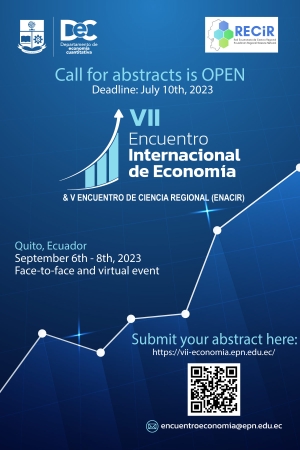
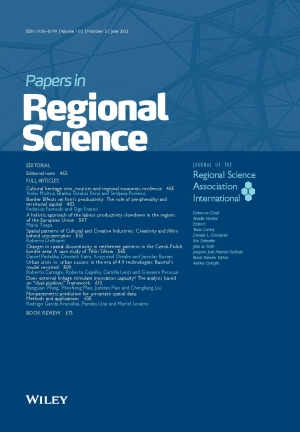


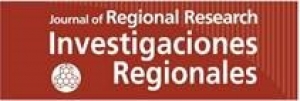
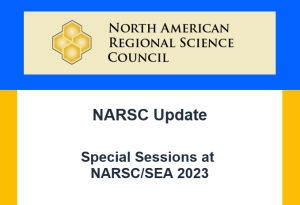

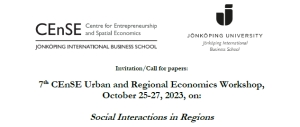
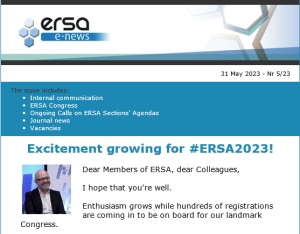

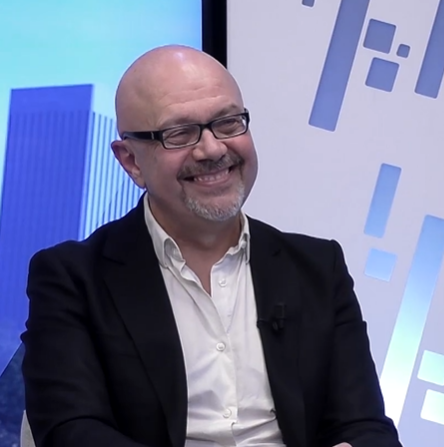 Dear Members of ERSA, dear Colleagues,
Dear Members of ERSA, dear Colleagues,









